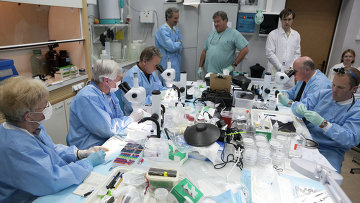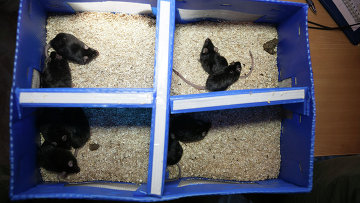
© Photo: Institute of Biomedical Problems
MOSCOW, December 10 - RIA Novosti. Vladimir Sychev, one of the "Bion-M" satellites of the founders, told RIA "News" about how Russian biocompanion help us understand how to move the biosphere into space, as the Russian scientists tested the theory of entering life on Earth from space, and shared his thoughts about as the collapse of the "Progress" will affect the Russian space science.
This week, in the walls of the Presidium of the Russian Academy of Sciences in Moscow hosted an international conference on space medicine and biology, conducted by the Institute of Biomedical Problems, Russian Academy of Sciences. As part of this conference, Russian scientists and their foreign colleagues have talked about the latest achievements in the study of how space affects the lives of humans and other living beings, and revealed plans for the future.
Vladimir Sychev, Deputy Director for Science, Institute of Biomedical Problems, told the conference about which experiments are members of the Institute and their foreign colleagues will carry on board the new Russian biocompanion "Bion-M2", and how these experiences affect the preparations for travel into deep space . He told RIA "News" about how important such studies to save the Russian leadership in the field of manned space flight.
- Vladimir Nikolaevich, given the significant reduction in the financing of the scientific part of the Russian space program for the next 10 years and shift of many projects at a later date, if you expect problems for "Bion-M2" and subsequent biosatellites if ekonmicheskaya situation does not improve?
- So far as I know, we can say that these cuts will not affect the implementation of the "Bion" program. But, in fact, this is only our opinion and say something for sure in this case is very difficult.
The money required for the implementation of our projects are very modest compared with those programs, which leads the Institute for Space Research. There really is a lot of money allocated to some projects have questions, but to judge their condition is difficult, as we look at them from the side. In general, I can say that until problems have been encountered.
- In April 2014, NASA has banned its employees to participate in co-operation with Russian scientists. Does this affect the analysis of the results of experiments on board the "Bion-M" and whether this creates problems with the "Bion-M2"?
- In fact, the problems with the first "Bion" was not - no one bothered to our cooperation and our American colleagues have participated in it fully. About the second "Bion" we are now talking and working on options. It is difficult to say whether this is good or bad, but the situation is moving forward.
- As part of the past "Bion" you conducted an interesting experiment to test the theory of panspermia, the possibility of entering life on Earth from space, and in 2013 you talked about the fact that his conclusions are partially confirmed, but tablets with microbes split probe when landing. Did you learn something new?
- Yes, we have found microbes in the samples, it was found that they survived the landing. This was done as a bacteria, extremophiles, and ordinary bacilli. So, in principle, the possibility of survival of spores of microorganisms in meteorites is proven.
- Nevertheless, you are still planning to conduct similar experiments on board the "Bion-M2"?
- We will hold them because, you know, there are a few subtleties. We need to know what the temperature is heated up to the probe body at the entrance to the atmosphere as it is heated by one party and the other as a heated, and compare it with what is happening with meteorites. Meteorites, moreover, explode or burn completely when entering the atmosphere. In general, there are many difficulties, many things that need to be clarified.
On the other hand, if you believe in panspermia, to what extent we can already say that this is possible. If you do not believe in it, then the fact of the survival of microbes in such circumstances does not say anything on his own.
- Recently your colleagues from the University of California at Irvine showed in mice on the ground that prolonged exposure to cosmic rays leads to a decrease in mental abilities. Is it possible to conduct such experiments on biosatellites?
- The answer to this question, we have already received the first "Bion". Our colleagues in the experiments on mice found that a long life in orbit leads to major changes in the dopamine system of the brain. This affects the learning of rodents - it has fallen sharply after the flight and return to Earth rodent.
- Is this how a fight? Does it hurt to fly to Mars or building bases on the moon?
- You see, all of these studies are now at a very early stage, we are still only beginning to accumulate statistics. We only begin to appear understanding of what we encounter in the open space. How to deal with it?
Experience the astronauts who flew to the moon and lunar orbit it shows that those who descended to the surface of the planet, felt on returning to Earth better than those crew members of "Apollo", which remained in orbit. In other words, the options on how you can avoid these negative effects can be very different, and we have only begun to investigate what causes these effects.
- How long at all possible biological experiments in orbit, which can last six months or a year to study such effects?
- All you can do if you have the appropriate resources. In principle, the animals can be maintained in orbit for more than 30 days, but it will require a very serious equipment and a serious approach to solve this problem.
The Americans, for example, carried out their research on mice on board the ISS, but still there are animals spend no more than 30 days. There are great difficulties associated with the fact that in fact, when you send the body into space, or basically in any environment, isolated from the biosphere, you have to provide him with life support systems. It is necessary to ensure that the animal will survive throughout this period.
For space flight is a rather difficult task, which probably can be realized on the ISS, but not exactly on board biosatellites. Moreover, long-term experiments with animals does not always happen we need.
For example, if we take the typical duration of the life of the mouse and compare it to the length of human life, then the 30 day flight for the rodent will be approximately equal to a two-year stay in space for us. Using these principles, we pretends consequences for the person using the data that we receive on biosatellites. And besides, the record duration flight today is half of the year.
In addition, there is a significant difference between animals and astronauts - last actively fighting the negative effects of weightlessness on their bodies, and the animals are just "inside" of the weightlessness, and no preventive maintenance they have. And so what we see in experiments on animals, in humans, we often can not see due to the fact that these effects are stopped by means of which we have been developing for the astronauts could return to Earth healthy.
Therefore, studies in animals and is important for us - with their help, we can see the effects that we see in part and in the human body, but do not understand their depth.
- Do you think it possible to reconstruct a greenhouse on the ISS, and if so, how important it is for Russia's space science in the context of a possible lag behind China and the United States, and to progress in establishing bioregeneratsionnyh systems for operations in deep space?
- Speaking at the conference, I said no wonder that we are in a dangerous situation, we can say that we now eat up recent advances that have been received 40 years ago in the Soviet Union.
In general, the problem of human existence is the biosphere is a very complicated and complex issue that can not be reduced to a specific problem - you can not just go and say that we need to create a life-support system for a lunar base, or a Martian spaceship.
All these tasks are much broader and more complex - Americans have long tried to create a copy of the Earth's biosphere in the experiments of John Allen and Mark Nelson in Arizona in 1993. They opted for a complete copy of the biosphere of the planet, but they did not succeed, because their "Biosphere 2" was not what is in the Earth's biosphere.
The fact that the biosphere of the planet has a huge buffering - we are surrounded by the ocean air and water, and huge masses of soil and rock. We're throwing away a huge amount of carbon, which kopilsya underground millions and billions of years as a result of biological systems. Only now we have started to notice some changes, although not yet entirely clear whether they are related to these actions of mankind.
What I am saying is that all? Biological systems are much wider than a greenhouse, which serves a source of oxygen. It is therefore very disappointing thing for us, the loss of "Lada". Let's try or not to try it, we restore, succeed or fail to do so - is another question.
All this does not negate the fact that experiments with plants will still continue. Plants can play different roles in the life of man in space - they can be a source of vitamins, help the crew with the psycho-physiological point of view. For example, the crew of our project "Mars-500" has the ability to grow or flowers or lettuce in the greenhouse.Analysis of how all these factors affect a person's life is critical for us.






No comments:
Post a Comment